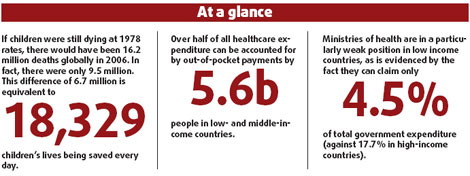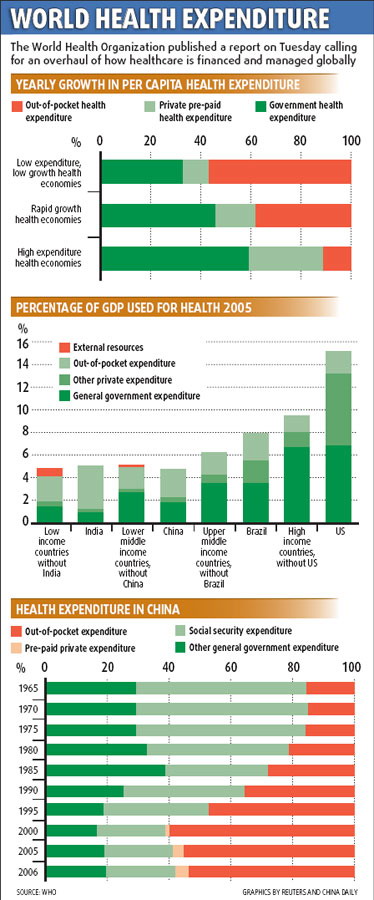
|
WORLD> Global General
 |
|
World's poorest facing health crisis: WHO
(China Daily)
Updated: 2008-10-16 07:03 About 100 million people fall into poverty each year paying for healthcare, the World Health Organization (WHO) said in the World Health Report 2008, published in Almaty, Kazakhstan on Tuesday. The report, Primary healthcare - now more than ever, critically assesses the way healthcare is organized, financed and delivered in rich and poor countries around the world. On this occasion, the WHO hopes to start a global conversation on the effectiveness of primary healthcare as a way of reorienting national health systems, because the source of the problem is that health systems and health development agendas have evolved into a patchwork of components.
"In short, health systems are unfair, disjointed, inefficient and less effective than they could be," the WHO said. "Rather than improving their response capacity and anticipating new challenges, health systems seem to be drifting from one short-term priority to another, an increasingly fragmented and without a clear sense of direction," the report said.
This is evident in the excessive specialization in rich countries and donor-driven, single disease focused programs in poor ones, it said. A vast proportion of resources are spent on curative services, neglecting prevention and health promotion that could cut 70 percent of global disease burden, it said. Medical care in the rich world has also become dangerously fragmented, according to the report. It said front-line health workers ought to better assess patients' overall needs instead of referring them to costly specialists.
"This contributes to inefficiency, restricts access and deprives patients of opportunities for comprehensive care," the report said. "In far too many cases, people who are well-off and generally healthier have the best access to the best care, while the poor are left to fend for themselves." Profit-driven care has also increased the use of unnecessary tests and procedures, prompted more frequent and longer hospital stays, driven up overall costs and excluded those who cannot pay, the Geneva-based agency said. Annual government spending on health worldwide varies from just $20 to more than $6,000 per person. Besides the fact that roughly 100 million people a year fall below the poverty line because of personal health expenditure, the WHO said as many as 5.6 billion people have to pay for more than half of their health expenditures themselves. Also, nearly 60 million women will give birth without any medical assistance this year, the report said. Some 58 million of the 136 million women who will have babies this year will lack medical help during and after their births, it said. The WHO said that the billions of aid dollars devoted to fight specific epidemics like AIDS had distracted attention from providing comprehensive care to mothers and children. The difference in life expectancy between the richest and poorest countries still exceeds 40 years, the report said, of which launch coincided with a global financial crisis that could freeze aid flows and squeeze government budgets for healthcare. Increasingly specialized and technical medicine in wealthy nations has also excluded and impoverished millions of patients, exposing failures of laissez-faire governance in health, according to Margaret Chan, the WHO's director-general and a former Hong Kong health director.  "We are, in effect, encouraging countries to go back to basics," Chan said in an introduction to the WHO report. The report estimated that focusing more on disease prevention and health promotion - through vaccine and nutrition-boosting program - could cut the global burden of infirmity by 70 percent. Despite huge foreign aid sums earmarked for program fighting AIDS, tuberculosis, malaria and other killer diseases in developing countries, quality care remains scarce outside these areas, it said.  "Disproportionate investment in a limited number of disease programs considered as global priorities in countries that are dependent on external support has diverted the limited energies of ministries of health away from their primary role," it said. Governments have a responsibility to extend healthcare to all who need it, and to support good community health through education, food and safety standards, and clean water and sanitation services, Chan said. Inequitable access and the high cost of healthcare could erode social stability in a number of vulnerable countries, she said. "A world that is greatly out of balance in matters of health is neither stable nor secure," Chan said. The publishing of the report also commemorated the 30th anniversary of the Alma-Ata International Conference on Primary Healthcare held in 1978. That event was the first to put health equity on the international political agenda. China Daily-Agencies |